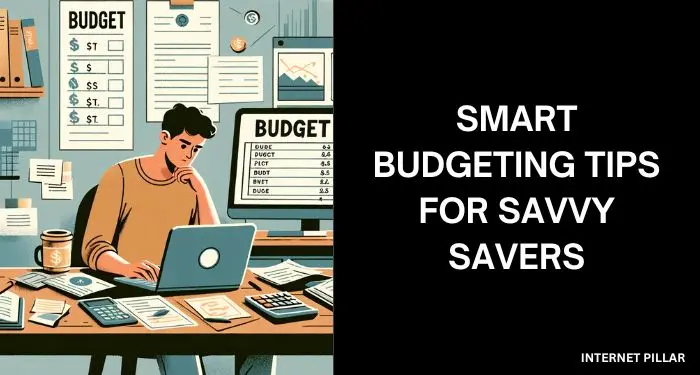Budgeting is a extremely important activity for managing money.
You might be tempted to spend without a plan but a budget helps you understand your finances and make judicious and better decisions.
A budget acts as a roadmap to achieve your dreams by helping you in monitoring income and expenses.
While budgeting might seem daunting or restrictive it is important for financial freedom.
It’s especially relevant for students seeking the cheapest way to live alone.

By learning and applying budgeting tips you can manage finances effectively and make the most of your money.
Let’s get started.
21 Smart Budgeting Tips for Savvy Savers
1. Creating a Budget
Creating a budget is super important regardless of your income level.
It is a tool for understanding your income and expenses by helping you to manage your money and save effectively.
A budget highlights “where your money goes” and identifies areas for cost-cutting and ensures you don’t overspend.
Start by evaluating your savings goals.

Unrealistic goals can be discouraging so aim for achievable targets. Use Edwin Locke’s SMART method for goal setting.
This approach means your goals should be Specific, Measurable, Attainable, Relevant and Time-bound.
Adhering to these criteria makes your budget realistic and actionable.
2. Sticking to Your Budget
Creating a budget is just the beginning; the real challenge is adhering to it.
Budgets aren’t set in stone; they’re dynamic and should be updated as your financial situation changes.
Regularly reviewing and adjusting your budget keeps it relevant and effective.
3. Setting Savings Goals
Setting clear achievable savings goals is an integral part of budgeting.
Whether your goal is saving a few hundred dollars or a big amount ensure it aligns with your budget.
Goals can be for specific purposes like vacations or major purchases or general like emergency funds.
It might require sacrifices like cutting subscriptions or other non-essential expenses.
Your financial goals can vary in time frame.

Long-term goals might include saving for a house or retirement while short-term goals could focus on vacations or special purchases.
Regardless they should follow the SMART (Specific, Measurable, Achievable, Realistic and Timebound) criteria.
4. Differentiate ‘Needs’ from ‘Wants’
Understanding the difference between needs and wants can significantly impact your budgeting success.
It’s easy to justify unnecessary expenses but focusing on needs rather than wants allows for more flexibility and savings in your budget.
This distinction helps in prioritizing expenses and aligns your spending with your financial goals.
5. Managing Separate Savings and Spending Accounts
Having separate accounts for savings and spending simplifies tracking your finances.
Use one account for everyday expenses like groceries and another exclusively for savings.
This separation helps you monitor your spending and savings progress.
When necessary transfer money from savings to your spending account but do so cautiously to meet your savings goals.
6. Monitoring Your Bank Balance
Regularly checking your bank balance is vital for spotting any suspicious activity such as identity theft.
List all sources including salary, alimony, child support, rental income and any distributions from retirement accounts.

Tools like Mint YNAB or Empower can help track your income and expenses simplifying the budgeting process.
7. Holding Yourself Accountable
Staying disciplined with your budget and savings is important. Life may sometimes require budget adjustments but be vigilant against unnecessary spending.
Accountability can be increased by involving a friend or family member joining online financial forums or seeking a financial advisor.
These resources can offer support and guidance in sticking to your financial goals.
8. Opting for a High-Interest Savings Account
Consider opening a high-interest savings account especially in times of low-interest rates.
While rates vary by age and institution some accounts offer competitive interest rates.
For example BOQ and Westpac have offered rates up to 2.5% p.a. for certain age groups.
Although rates for those over 30 might be lower choosing a high-interest account can significantly enhance your savings growth compared to regular accounts.
9. Considering Term Deposits
In a low-interest environment term deposits might not offer the best rates but can still be useful.
They differ from savings accounts as the money is locked for a set period imposing penalties for early withdrawal.
This can be beneficial if you’re prone to spending impulsively.
Term deposits come with various terms generally offering higher rates for longer commitments.
10. Use Public Transportation
In the age of convenience rideshare services and taxis are ubiquitous.
However their convenience often comes at a premium.
Consider embracing more economical alternatives such as trains instead of opting for pricier rideshares like Uber.

While it might require a bit more time the financial savings and reduced impact on the environment make public transportation an attractive choice for the frugal and environmentally conscious alike.
11. Utilizing Budgeting and Saving Apps
There are many apps designed to assist with budgeting and saving.
From ’round up’ apps that save small change from transactions to spending trackers and micro-investing tools these apps can help you manage everything from specific expenditures to overall savings.
Budgeting apps also often feature modern spreadsheet functions automating calculations and integrating with financial accounts.
Capital One credit cards for instance offer digital tools to facilitate spending and money management.
12. Limiting Online Shopping
The convenience of online shopping can lead to excessive spending.
To control this set limits on your online purchases. This could be a fixed frequency like once a month or every two months.
Committing to these limits can help keep your spending in check and align with your budgeting goals.
13. Maintaining a Spending and Savings Spreadsheet
Using a spreadsheet to track your expenses and savings can provide a detailed overview of your financial habits.
Tools like Excel allow you to categorize expenses into essentials and non-essentials helping you identify areas where you can cut costs.
Regular updates to this spreadsheet will offer a clear picture of your spending patterns and aid in maintaining a consistent savings plan.
14. Have an Emergency Fund
Having an “emergency fund” is an important step toward financial security.
It provides a shield for unwanted expenses such as home or car repairs, medical bills or loss of income.

Financial experts recommend saving at least ‘three to six months’ worth of living expenses in your emergency fund.
15. Compare Energy and Gas Providers
In the quest for budget-friendly living scrutinizing your energy and gas bills could be a game-changer.
Despite seemingly offering identical services energy and gas providers vary in pricing.
Leveraging online tools like the government’s Energy Made Easy can unveil potential savings by comparing providers.
This process requires minimal effort and doesn’t necessitate altering daily habits making it an easy avenue for financial relief.
16. Turn Off Lights and Appliances while leaving home
Wasteful energy consumption is a financial and environmental concern.
Simple practices such as turning off lights and electronic devices when leaving a room can translate into substantial savings over time.
By adopting this habit individuals can ensure they are not billed for energy they are not actively using.
This not only benefits personal finances but also contributes to a reduced carbon footprint by decreasing overall energy demand.
17. Get Health Insurance
Private health insurance is a very important aspect of personal finance but having excessive coverage can be counterproductive.
Many individuals may find themselves covered for services they rarely or never use.
It’s prudent to periodically review health insurance plans to ensure they align with individual health needs.
For instance having physiotherapy coverage when not utilizing such services may indicate an unnecessary expense.
By customizing health insurance coverage to specific needs individuals can optimize both their health protection and financial outlay.
18. Paying Loans on Time
Avoiding late fees on loans is a practical way to save money.
Whether you have a personal loan or credit card debt late payments often result in additional fees.
To prevent this ensure you mark repayment due dates on your calendar and prioritize timely payments.
Paying off debt should be a priority especially high-interest credit card debt.
19. The 50/30/20 Rule
The 50/30/20 rule offers a structured approach to budgeting:
- 50% of income for “needs” like rent and bills.
- 30% for “wants” including dining out grooming and shopping.
- 20% allocated to savings or debt repayment.

This rule created by US senator Elizabeth Warren serves as a guide for budgeting and saving even with a modest income.
Consider automating your expenses according to this rule to simplify budget management.
20. Determining Average Monthly Expenses
Categorize expenses into fixed (e.g. rent insurance) and variable (e.g. groceries utilities).
Calculate average monthly costs for variable expenses providing a clearer view of your cash flow and overall finances.
This step helps in budgeting effectively.
21. Making Adjustments When Needed
Your budget isn’t set in stone; adjustments may be necessary.
If your expenses exceed your income consider cost-effective alternatives.
Conversely if you have surplus funds allocate them to savings or future goals.
Remember that your budget can adapt to changes in your life and financial situation.
I hope these steps will help you in creating a realistic and smart budget.